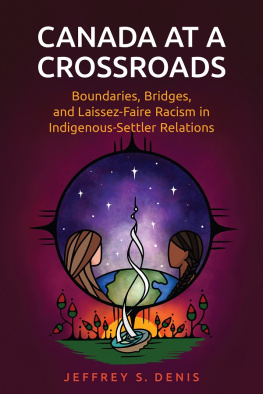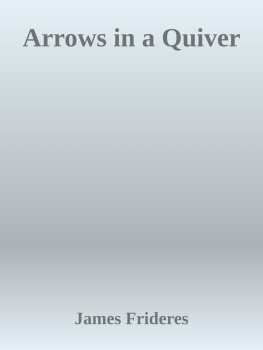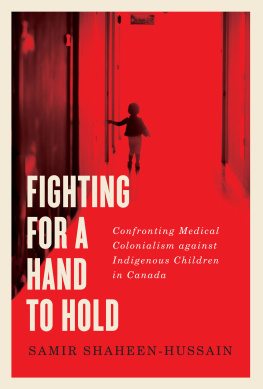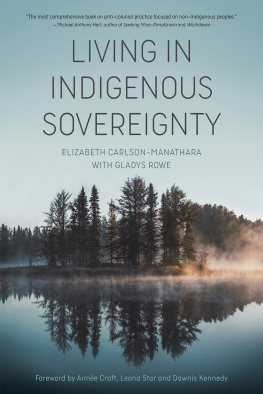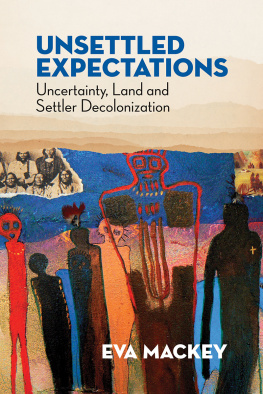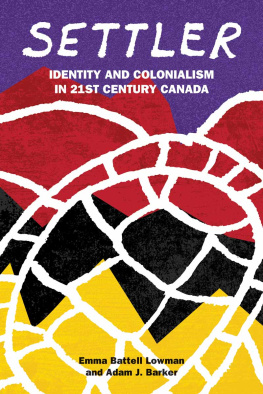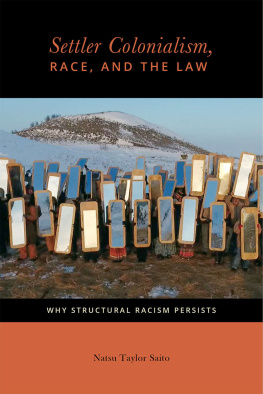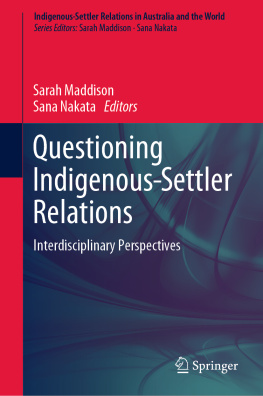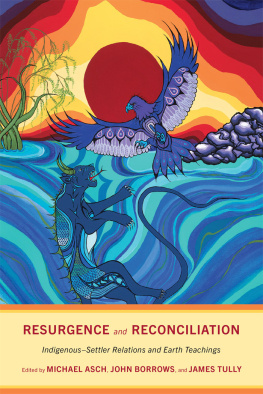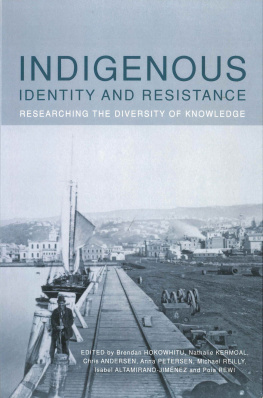
CANADA AT A CROSSROADS
Boundaries, Bridges, and Laissez-Faire Racism in Indigenous-Settler Relations
Drawing on group position theory, settler colonial studies, critical race theory, and Indigenous theorizing, Canada at a Crossroads emphasizes the social psychological barriers to transforming white settler ideologies and practices and working towards decolonization. After tracing settlers sense of group superiority and entitlement to historical and ongoing colonial processes, Denis illustrates how contemporary Indigenous and settler residents think about and relate to one another. He highlights how, despite often having close cross-group relationships, residents maintain conflicting perspectives on land, culture, history, and treaties, and Indigenous residents frequently experience interpersonal and systemic racism. Denis then critically assesses the promises and pitfalls of commonly proposed solutions, including intergroup contact, education, apologies, and collective action, and concludes that genuine reconciliation will require radically restructuring Canadian society and perpetually fulfilling treaty responsibilities
JEFFREY S. denis is an associate professor of sociology at McMaster University and a settler Canadian of mixed European ancestry living on the lands of the Anishinaabe and Haudenosaunee nations in Dish with One Spoon territory.
Canada at a Crossroads
Boundaries, Bridges, and Laissez-Faire Racism in Indigenous-Settler Relations
JEFFREY S. DENIS
UNIVERSITY OF TORONTO PRESS
Toronto Buffalo London
University of Toronto Press 2020
Toronto Buffalo London
utorontopress.com
Printed in Canada
ISBN 978-1-4426-4654-4 (cloth)ISBN 978-1-4426-6601-6 (EPUB)
ISBN 978-1-4426-1447-5 (paper)ISBN 978-1-4426-6600-9 (PDF)
Library and Archives Canada Cataloguing in Publication
Title: Canada at a crossroads : boundaries, bridges, and laissez-faire racism in Indigenous-settler relations / Jeffrey S. Denis.
Names: Denis, Jeff, 1980, author.
Description: Includes bibliographical references and index.
Identifiers: Canadiana (print) 20200156594 | Canadiana (ebook) 20200156756 | ISBN 9781442646544 (cloth) | ISBN 9781442614475 (paper) | ISBN 9781442666016 (EPUB) | ISBN 9781442666009 (PDF)
Subjects: LCSH: Whites Ontario Rainy River (District) Relations with Indians. | LCSH: Racism Ontario Rainy River (District) | LCSH: Rainy River (Ont. : District) Race relations.
Classification: LCC FC3099.R34 Z7 2020 | DDC 305.8009713/117 dc23
Cover art: Niiyobinaasiik (Danielle H. Morrison) is of the Sturgeon clan and a member of the Anishinaabeg of Naongashiing. Her cover artwork is inspired by the theme of building bridges, reflected in the coming together of two beings through the practice of ceremony and prayer. In Anishinaabe tradition, every mindful process starts with a smudging ceremony. It cleanses and prepares the spirit for our daily work. It is grounding in times of difficulty. In this depiction, two strands of smoke are intertwined as they carry the prayers and intentions of the two figures to the vastness above, where the Great Spirit sits. In a world that is wrought with tensions and conflict, mutual understanding is found through the coming together and sharing of space and time. Relationship building is the way forward.
This book has been published with the help of a grant from the Federation for the Humanities and Social Sciences, through the Awards to Scholarly Publications Program, using funds provided by the Social Sciences and Humanities Research Council of Canada.
University of Toronto Press acknowledges the financial assistance to its publishing program of the Canada Council for the Arts and the Ontario Arts Council, an agency of the Government of Ontario.

Contents
Figures
Tables
This book is a result of many years of hard work and (un)learning. Writing it would not have been possible without the assistance and support of many individuals and groups.
First and foremost, I would like to acknowledge all residents of the Rainy River District who contributed to this project and who made me feel welcome in the Fort. Thank you to the Fort Frances Chiefs Secretariat, the Sunset Country Mtis Council, and the Grand Council Treaty No. 3 for allowing me to conduct research in your territories. I am especially grateful to all interviewees and photovoice participants for generously sharing your time, knowledge, experiences, opinions, and stories. Although some may disagree with some of my interpretations and conclusions, I sincerely appreciate your trust in me and hope that you will find this book useful for working towards a more just and sustainable world.
Several residents deserve special recognition for their role in offering support and guidance at various stages. Some acted as gatekeepers or provided essential documents; others taught me cultural protocols for interacting with Anishinaabe Elders and chiefs; still others invited me to participate in fishing trips, sweat lodge ceremonies, backyard barbecues, birthday parties, and other events. The following people contributed in such critical ways: Gary Allen, Wanda Botsford, Pam Cain, Clint Calder, Cuyler Cotton, Hugh and Robin Dennis, Rhoda Dickson, Naomi Field, Elaine Fischer, Giiwetinoong Binecke (Lori R. Flinders), Dorothy Friesen, Andrew George, Dawn Hayes, Janice Henderson, Bebaamweyaazh (Robert Animikii Horton), Mashkawegaabo (Al Hunter), Sandra Indian (Spirit Horse), Candace Jourdain, Glenn Jourdain, Janet Loney, Peggy Loyie, Bessie Mainville, Mark McCaig, Ed and Betty McLeod, Ed Morrison, Dan Morriseau, Naa-Gaabiinegee-zhig (Calvin Morrisseau), Mona-Rose Morrisseau, Rick Nielson, Paul Pirie, Joseph Shebagegit, Gilbert Smith, the late Gene Stoltzfus, Mary Ann Swain, and the Right Relations Circle. (It should not be inferred that all these individuals were formally interviewed.) The United Native Friendship Centre kindly provided space for photovoice meetings. The Mtis Community Hall in Fort Frances, Knox United Church in Emo, and Fort Frances Public Library hosted public presentations of drafts of this manuscript.
The following agencies and organizations provided financial support for research, writing, and photovoice: the Frank Knox Memorial Fellowships, the Harvard University Native American Program, the Multidisciplinary Program in Inequality and Social Policy at John F. Kennedy School of Government, the National Science Foundation, the Social Sciences and Humanities Research Council of Canada, the University of Toronto/McMaster University Indigenous Health Research Development Program, and the Weatherhead Center for International Affairs, Canada Program.
Although I conducted every interview and edited every transcript, the following persons assisted by transcribing one or more interviews: Victoria Boquiren, Rachel Bruner, Romeo Colobong, Rystle Enverga, Tazeen Hasni, Michelle Kellaway, Sandra Kimber, Kasia Krzyzanowski, Doris Liaw, Shana Maracle, Elizabeth McCarville, Jenn Pritchard, Eloisa Sarmiento, Elysse Schlein, Fadek Taki, Linda Zhang, and the Cambridge Transcription Company.
Drafts of various chapters were presented at the following conferences and workshops: American Sociological Association, Canadian Sociological Association, Culture and Social Analysis Workshop (Harvard University), Craft of Ethnography Workshop (Columbia University), Eastern Sociological Society, Harvard-Oxford-Stockholm Aage Sorensen Memorial, Harvard University Native American Program Colloquium, Inter-Ivy Sociology Symposium, National Gathering of Graduate Students in Aboriginal Health Research, Responses to Discrimination and Racism: Comparative Perspectives Symposium (Harvard University), and Qualitatives. I was also invited to present earlier versions of the book manuscript and received helpful feedback from members of the departments of sociology at Lakehead University, McGill University, and McMaster University, and at Reconciliation Kenoras inaugural AGM.
Next page
